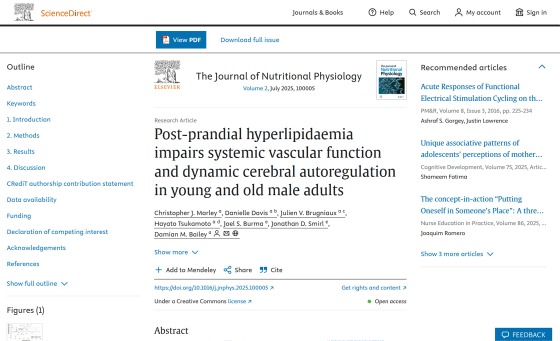Just one fatty meal can reduce blood flow to the brain

Some people may treat themselves to a fatty meal they wouldn't normally eat on a Friday night after a weekday workday or a weekend get-together with a friend they haven't seen in a while, but new research has found that even eating a single high-fat meal can reduce blood flow to the brain, potentially increasing the risk of stroke and dementia.
Post-prandial hyperlipidaemia impairs systemic vascular function and dynamic cerebral autoregulation in young and old male adults - ScienceDirect

We fed people a milkshake with 130g of fat to see what it did to their brains – here's what we learned
https://theconversation.com/we-fed-people-a-milkshake-with-130g-of-fat-to-see-what-it-did-to-their-brains-heres-what-we-learned-259961
The fats in our diet not only serve as a source of energy for the body, but also play important roles such as transporting vitamins, protecting organs, and maintaining body temperature. The fats we consume are mainly divided into saturated and unsaturated fatty acids, but excessive intake of saturated fatty acids, which are found in large amounts in fast food and sweets, is known to have adverse effects on the blood vessels and heart.
Furthermore, the effects of saturated fats extend beyond the blood vessels and heart, potentially causing problems for the brain as well. Because the brain has limited energy reserves, it requires a continuous supply of oxygen and glucose via the bloodstream to maintain normal function. The mechanism by which the body maintains blood flow to the brain is called dynamic cerebral autoregulation , a process that allows blood flow to remain stable even when blood pressure fluctuates due to standing or exercise.
However, if a high-fat diet or other factors have a negative effect on the blood vessels and heart, the dynamic autoregulation of cerebral blood flow can be impaired, and the amount of blood reaching the brain may temporarily become too little or too much. If this condition persists, it is said to increase the risk of developing stroke, dementia, and other conditions.

When we eat a meal high in saturated fat, blood lipid levels rise, peaking about four hours after eating. At the same time, blood vessels become stiffer and lose their ability to relax and dilate. However, it was unclear how blood supply to the brain is affected during this period.
A research team led by
To assess cardiac health, the researchers measured the dilation of blood vessels in the arms in response to increased blood flow, as well as blood flow in the brain. To assess how well the brain's blood vessels respond to changes in blood pressure, participants performed bodyweight squats to vary their blood pressure. The high-fat meal consisted of a milkshake with plenty of whipped cream, containing a whopping 1,362 calories and 130g of fat.

The results of the study confirmed that a high-fat diet reduces the ability of blood vessels to dilate and weakens the brain's ability to buffer blood pressure fluctuations in both young and older people, and suggested that the negative effects of a high-fat diet on the brain are greater in older people.
While the current study did not examine the long-term effects of a high-fat diet on mental function, previous research by Marley and colleagues has shown that a high-fat diet increases free radicals that damage cells and decreases nitric oxide , which helps blood vessels dilate. These factors may explain the decline in blood flow regulation observed in the current study.
'Our findings suggest that even a single high-fat meal can have an immediate impact on the body,' said Marley. 'A diet low in saturated fats is important for protecting not only heart health but also brain health, and it's especially important for older adults, who are at higher risk of stroke and neurodegenerative diseases.'
While UK public health guidelines recommend replacing saturated fats with polyunsaturated fatty acids, found in fish and nuts, it is unclear how the brain responds to these diets. Furthermore, because this study only included men, it is unclear how women's brains respond to a high-fat diet.
'Our study is a reminder that diet not only influences long-term health, but also has real-time effects on the body and brain,' said Marley. 'And it's becoming clear that every meal matters when it comes to protecting brain health.'
Related Posts:
in Free Member, Science, Food, Posted by log1h_ik







